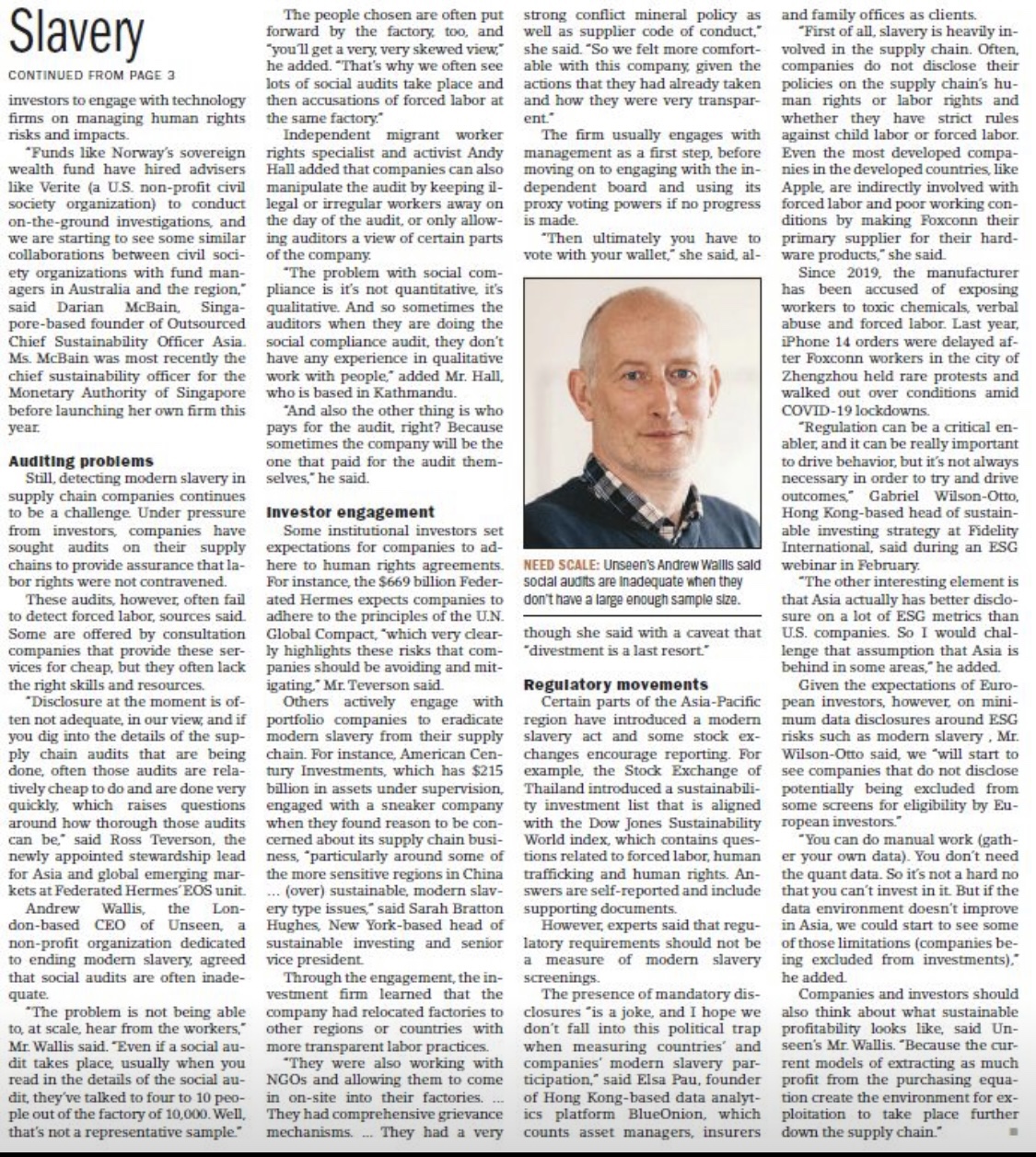An important investment industry focused article on the role of investors, forced labour, audits and effective due diligence
ESG April 03, 2023
Modern slavery audits in supply chains subpar for investors
Available at: https://www.pionline.com/esg/modern-slavery-auditing-asian-supply-chains-subpar-investors

Unseen’s Andrew Wallis said social audits are inadequate when they don’t have a large enough sample size.
Institutional investors have become more aware of the risks of modern slavery in their portfolio companies’ supply chains, but detecting labor issues is an uphill battle as companies chase profits and the industry lacks skills to detect labor issues.
In emerging Asia, where the bulk of supply chain companies are located, regulations are not yet at a level where they’re an effective deterrent, sources said.
According to the United Nations, modern slavery refers to “situations of exploitation that a person cannot refuse or leave because of threats, violence, coercion, deception, and/or abuse of power.”

An estimated 50 million people were living in modern slavery in 2021, of which 28 million were in forced labor (the rest were trapped in forced marriages), according to a report by the International Labour Organization.
In recent years, listed companies have been exposed for having signs of forced labor in their supply chains. Apple Inc. has been accused by research organizations and news outlets of having suppliers with forced labor practices, including using labor from the Xinjiang province in China. In 2021, Dyson Ltd. cut ties with Malaysian supplier ATA IMS Bhd after ATA was found to have subjected its migrant workers to abusive conditions.
As a result, human rights concerns have become increasingly important to investors. The Swedish AP funds’ Council on Ethics, which represents the sustainable efforts of several Swedish asset owners, brought together investors to engage with technology firms on managing human rights risks and impacts.
“Funds like Norway’s sovereign wealth fund have hired advisers like Verite (a U.S. non-profit civil society organization) to conduct on-the-ground investigations, and we are starting to see some similar collaborations between civil society organizations with fund managers in Australia and the region,” said Darian McBain, Singapore-based founder of Outsourced Chief Sustainability Officer Asia. Ms. McBain was most recently the chief sustainability officer for the Monetary Authority of Singapore before launching her own firm this year.
New York comptroller questions Blackstone on child labor at portfolio company
Auditing problems
Still, detecting modern slavery in supply chain companies continues to be a challenge. Under pressure from investors, companies have sought audits on their supply chains to provide assurance that labor rights were not contravened.
These audits, however, often fail to detect forced labor, sources said. Some are offered by consultation companies that provide these services for cheap, but they often lack the right skills and resources.
“Disclosure at the moment is often not adequate, in our view, and if you dig into the details of the supply chain audits that are being done, often those audits are relatively cheap to do and are done very quickly, which raises questions around how thorough those audits can be,” said Ross Teverson, the newly appointed stewardship lead for Asia and global emerging markets at Federated Hermes’ EOS unit.
Andrew Wallis, the London-based CEO of Unseen, a non-profit organization dedicated to ending modern slavery, agreed that social audits are often inadequate.
“The problem is not being able to, at scale, hear from the workers,” Mr. Wallis said. “Even if a social audit takes place, usually when you read in the details of the social audit, they’ve talked to four to 10 people out of the factory of 10,000. Well, that’s not a representative sample.”
The people chosen are often put forward by the factory, too, and “you’ll get a very, very skewed view,” he added. “That’s why we often see lots of social audits take place and then accusations of forced labor at the same factory.”
Independent migrant worker rights specialist and activist Andy Hall added that companies can also manipulate the audit by keeping illegal or irregular workers away on the day of the audit, or only allowing auditors a view of certain parts of the company.
“The problem with social compliance is it’s not quantitative, it’s qualitative. And so sometimes the auditors when they are doing the social compliance audit, they don’t have any experience in qualitative work with people,” added Mr. Hall, who is based in Kathmandu.
“And also the other thing is who pays for the audit, right? Because sometimes the company will be the one that paid for the audit themselves,” he said.
Church Commissioners for England creates fund to counter effects of slavery
Investor engagement
Some institutional investors set expectations for companies to adhere to human rights agreements. For instance, the $669 billion Federated Hermes expects companies to adhere to the principles of the U.N. Global Compact, “which very clearly highlights these risks that companies should be avoiding and mitigating,” Mr. Teverson said.
Others actively engage with portfolio companies to eradicate modern slavery from their supply chain. For instance, American Century Investments, which has $215 billion in assets under supervision, engaged with a sneaker company when they found reason to be concerned about its supply chain business, “particularly around some of the more sensitive regions in China … (over) sustainable, modern slavery type issues,” said Sarah Bratton Hughes, New York-based head of sustainable investing and senior vice president.
Through the engagement, the investment firm learned that the company had relocated factories to other regions or countries with more transparent labor practices.
“They were also working with NGOs and allowing them to come in on-site into their factories. … They had comprehensive grievance mechanisms. … They had a very strong conflict mineral policy as well as supplier code of conduct,” she said. “So we felt more comfortable with this company, given the actions that they had already taken and how they were very transparent.”
The firm usually engages with management as a first step, before moving on to engaging with the independent board and using its proxy voting powers if no progress is made.
“Then ultimately you have to vote with your wallet,” she said, although she said with a caveat that “divestment is a last resort.”
Financial-sector actions can help end human slavery, trafficking – report
Regulatory movements
Certain parts of the Asia-Pacific region have introduced a modern slavery act and some stock exchanges encourage reporting. For example, the Stock Exchange of Thailand introduced a sustainability investment list that is aligned with the Dow Jones Sustainability World index, which contains questions related to forced labor, human trafficking and human rights. Answers are self-reported and include supporting documents.
However, experts said that regulatory requirements should not be a measure of modern slavery screenings.
The presence of mandatory disclosures “is a joke, and I hope we don’t fall into this political trap when measuring countries’ and companies’ modern slavery participation,” said Elsa Pau, founder of Hong Kong-based data analytics platform BlueOnion, which counts asset managers, insurers and family offices as clients.
“First of all, slavery is heavily involved in the supply chain. Often, companies do not disclose their policies on the supply chain’s human rights or labor rights and whether they have strict rules against child labor or forced labor. Even the most developed companies in the developed countries, like Apple, are indirectly involved with forced labor and poor working conditions by making Foxconn their primary supplier for their hardware products,” she said.
Since 2019, the manufacturer has been accused of exposing workers to toxic chemicals, verbal abuse and forced labor. Last year, iPhone 14 orders were delayed after Foxconn workers in the city of Zhengzhou held rare protests and walked out over conditions amid COVID-19 lockdowns.
“Regulation can be a critical enabler, and it can be really important to drive behavior, but it’s not always necessary in order to try and drive outcomes,” Gabriel Wilson-Otto, Hong Kong-based head of sustainable investing strategy at Fidelity International, said during an ESG webinar in February.
“The other interesting element is that Asia actually has better disclosure on a lot of ESG metrics than U.S. companies. So I would challenge that assumption that Asia is behind in some areas,” he added.
Given the expectations of European investors, however, on minimum data disclosures around ESG risks such as modern slavery , Mr. Wilson-Otto said, we “will start to see companies that do not disclose potentially being excluded from some screens for eligibility by European investors.”
“You can do manual work (gather your own data). You don’t need the quant data. So it’s not a hard no that you can’t invest in it. But if the data environment doesn’t improve in Asia, we could start to see some of those limitations (companies being excluded from investments),” he added.
Companies and investors should also think about what sustainable profitability looks like, said Unseen’s Mr. Wallis. “Because the current models of extracting as much profit from the purchasing equation create the environment for exploitation to take place further down the supply chain.”
